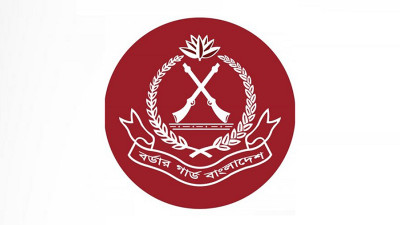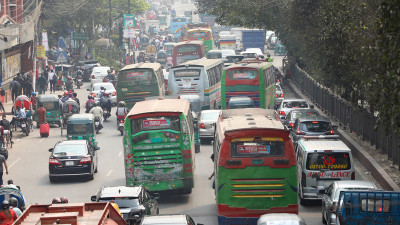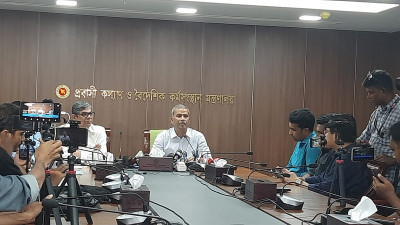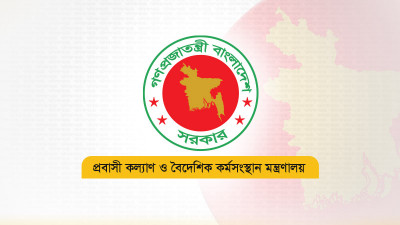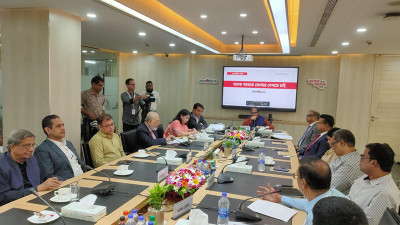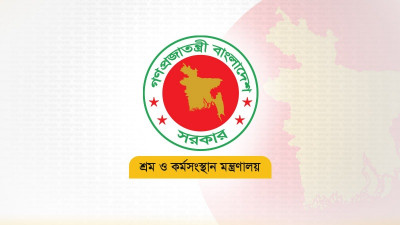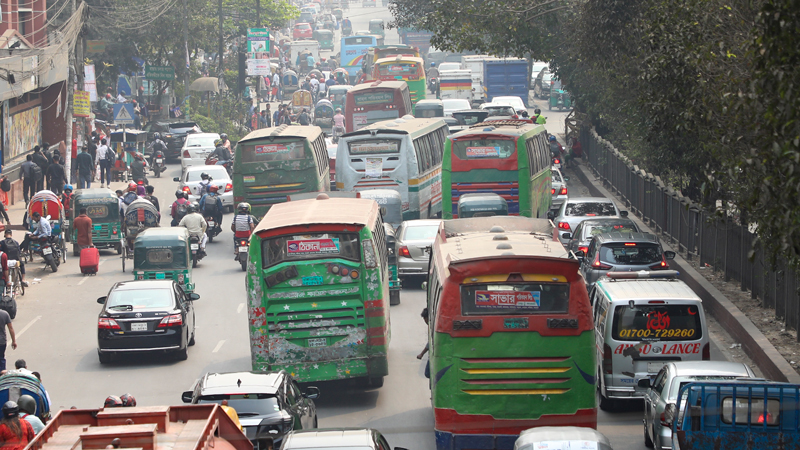 Photo: Bonik Barta
Photo: Bonik Barta Route A-309 is one of the busiest bus routes in Dhaka,
stretching approximately 42 kilometers from Sadarghat to Nabinagar via
Gulistan, Paltan, Shahbagh, Science Lab, Asad Gate, Gabtoli, and Savar. Savar
Paribahan Limited currently operates 204 buses daily on this route. However,
according to data collected by the Dhaka Transport Coordination Authority
(DTCA), 137 of these buses are illegal, with 83 needing route permits altogether.
Another busy route, A-406, runs from Ghatarchar to
Sonargaon. Rajanigandha Paribahan Private Limited operates 122 buses on this
route daily, of which only 13 are legal. On route A-317 (Diabari-Postogola),
Raida Enterprise operates 211 buses daily, with 100 of them being illegal. On
route A-441 (Nandan Park-Chashara), Moumita Transport Limited operates 198
buses, and 151 of them are illegal. Notably, Moumita Transport Limited is
co-owned by Afroza Zaman, the wife of Dhaka Metropolitan Police’s (DMP) former
commissioner, Asaduzzaman Mia.
The DTCA has gathered information on the number of buses,
both legal and illegal, operating in different areas of Dhaka through the
project titled ‘Preparation of Concept Design and Implementation Plan for Bus
Route Rationalization and Company-Based Operation of Bus Service in Dhaka’. An
analysis of this data reveals that 1,225 buses pass through Shahbagh daily, of
which 655 are illegal. Similarly, of the 575 buses operating via Motijheel, 262
are illegal. In Mohakhali, 514 out of 1,094 buses are illegal, and in Farmgate,
342 of 649 buses lack proper permits. The Badda-Rampura route sees 1,283 buses
daily, with 633 of them illegal. In Azimpur, 261 out of 412 buses are illegal;
in Jatrabari, 450 out of 754 buses are illegal; and in Mirpur, 433 out of 657
buses operate without legal permits.
According to the DTCA, more than 50 transport companies
are operating illegal buses in Dhaka. These include companies like Shikor,
Trans Silva, Bihanga, Airport Bangabandhu Avenue, Torongo, Maloncho,
Shubhojatra, Meghla, Borak, Himachal, Savar, Welcome, Dewan, Meghna Borak,
Rajanigandha, Shomoy Transport, Midline, D-One, Basumoti, Trust, Victor, Alif,
Prochesta, Robrob, Agradut, Roich, Achim, Raida, Falgun, Rajdhani Super, Akash,
Iqbal, Mirpur Super Link, Metro Link, Swadesh, Travels Mart, Moumita, Best
Shatabdi, Bikolpo, Elaik, Rongdhonu, Gazipur Paribahan, Himaloy, Lams, Al
Makka, Ayat, Provati Banasree, Balaka, Ajmeri, Tasin, Bikash, Monjil, Mirpur
United, Tanzil, Labbayek, Khaja Baba, Komol, Utshob, Turag, MM Lovely, Green
Anabil, Thikana, Poristhan, and Kironmala Paribahan.
The ‘Dhaka Metropolitan Regional Transport Committee’
assigns bus routes and issues route permits to various bus companies. However,
DTCA officials report that transport owners are operating buses illegally
without approval from the committee. On the other hand, transport owners claim
they are forced to operate without permits due to the committee’s inactivity.
Recently, a new company named Srijon Paribahan began
operating on the Gulistan-Narayanganj route, along with another new company,
Green Dhaka. Dhrubo Alam, DTCA Deputy Transport Planner and Project Director
for the Bus Route Rationalization project told Bonik Barta, “All data on
illegal buses, including the ones from these new companies, is being collected.
The authorities have been urged to take action. We are working toward
introducing a well-organized transport system in Dhaka. We are identifying
illegal buses on each route and have sent letters to the police, city
corporations, the Bangladesh Road Transport Authority, and other relevant
agencies, requesting legal action.”
Although the DTCA categorizes these buses as illegal due
to the lack of route permits or route violations, transport owners disagree. When
contacted, Saiful Alam, General Secretary of Dhaka Road Transport Owners
Association, told Bonik Barta, “The Regional Transport Committee (RTC) is
responsible for issuing route permits in Dhaka, but it has not been issuing
permits for over three years. During this period, many bus companies replaced
their buses, and demand for new routes also emerged. We want to operate buses
with permits. But while no permits are being issued, these buses are being
labeled as illegal, which is unjustified. Although these buses may be operating
outside their designated routes, they are not illegal as they have valid
registrations and fitness certificates, and all taxes have been paid. So, how
can they be deemed illegal?”
Transport experts argue that the disorder in Dhaka’s public transport system results from years of mismanagement. They attribute the chaos to both transport owners and successive governments. When asked for his opinion, Dr. Hadiuzzaman, former director of the Accident Research Institute at the Bangladesh University of Engineering and Technology (BUET), told Bonik Barta, “All the past political governments are responsible for the current state of Dhaka’s transport system. They gave transport owners and other stakeholders leeway to engage in improper practices, which has led to the current chaotic situation in our city. Buses without route permits or fitness certificates, as well as old, dilapidated buses, are completely unsuitable for Dhaka’s roads. Despite being meant to serve as the backbone of public transport in such a densely populated city, these buses have instead become a source of public suffering. I believe the entire public transport system in Dhaka needs to be overhauled. The government should acquire and manage all the buses on the roads under a state-owned or a single company-operated system. While we have heard promises of such initiatives for a long time, we have yet to see any real progress in their implementation.”

